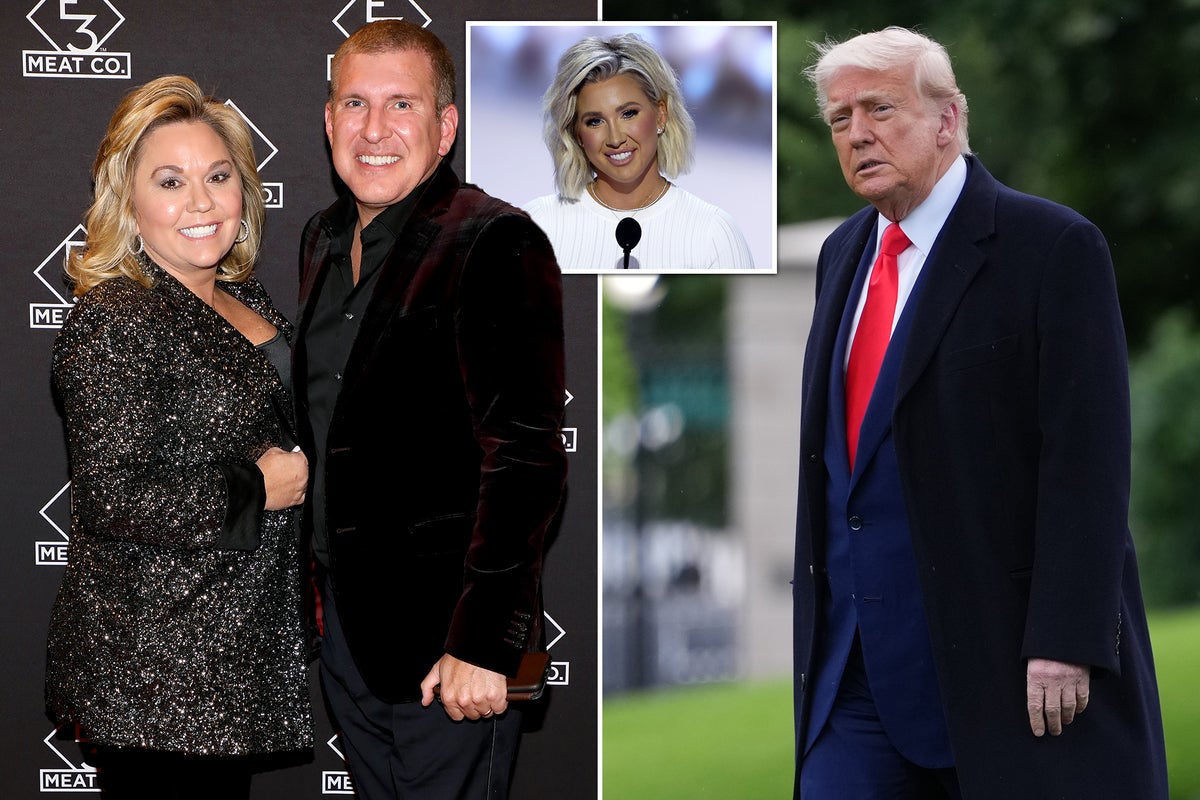Washington, D.C. – May 29, 2025
On May 27, 2025, President Donald Trump granted full pardons to Todd and Julie Chrisley, stars of the USA Network’s Chrisley Knows Best, who were convicted in 2022 of bank fraud, tax evasion, and related charges. The announcement, made via a White House video call with the couple’s children, Savannah and Grayson Chrisley, has reignited debates over Trump’s use of clemency powers, with supporters praising the decision and critics decrying it as favoritism toward high-profile allies.
Details of the Pardon
The Chrisleys were sentenced in November 2022 to 12 and 7 years in prison, respectively, for conspiring to defraud Atlanta-area banks of over $36 million in personal loans and evading taxes. Prosecutors described a “15-year fraud spree,” alleging the couple submitted falsified documents to secure loans for luxury cars, real estate, and designer clothing, while hiding income from the IRS. They were also ordered to pay $17.8 million in restitution.
Trump, in a video posted by White House aide Margo Martin on X, told Savannah Chrisley, “Your parents are going to be free and clean, and I hope we can do it by tomorrow… They were given pretty harsh treatment, based on what I’m hearing.” The pardons were finalized on May 28, with Trump citing the couple’s sentences as “far too harsh” and part of an “unjust justice system.” White House spokesperson Harrison Fields echoed this, stating, “The President is always pleased to give well-deserving Americans a second chance.”
Background and Controversy
Todd, 57, and Julie, 52, rose to fame through Chrisley Knows Best (2014–2023), which showcased their lavish lifestyle in Atlanta and Nashville. The show’s success drew scrutiny to their finances, leading to their 2019 indictment. Despite maintaining their innocence, a 2022 jury convicted them, and U.S. District Judge Eleanor Ross noted their “greed and flamboyance” at sentencing. Their sentences were later reduced—by two years for Todd and 14 months for Julie—but an appeals court upheld their convictions in 2024, though Julie’s case was briefly remanded for a sentencing error.
Savannah Chrisley, 27, has been a vocal advocate for her parents, speaking at the 2024 Republican National Convention and claiming they were “persecuted by rogue prosecutors in Fulton County” for their public profile. She compared their case to Trump’s legal battles, calling them the “Trumps of the South.” Her February 2025 White House visit and appearance on Lara Trump’s Fox News show underscored her lobbying efforts.
The pardon has drawn mixed reactions. Savannah expressed gratitude on Instagram Live, saying, “My parents get to start their lives over… Thank you, President Trump.” The family’s attorney, Alex Little, called it a correction of a “deep injustice,” alleging the Chrisleys were targeted for their “conservative values and high profile.” However, critics like @LanceWilson on X argued, “The Chrisleys defrauded banks out of $36 million—and they’re walking away… That’s white privilege.” Others, like @DoGoodBeKind1, labeled Trump’s clemency pattern a “shit show.”
Broader Context
Trump’s pardon of the Chrisleys aligns with his recent clemency actions, including pardons for January 6 rioters, a Virginia sheriff convicted of bribery, and a nursing home executive tied to tax crimes. Critics argue these moves favor politically aligned figures, noting the Chrisleys’ vocal support for Trump. The decision also precedes a new Lifetime docuseries, The Untitled Chrisleys Project, set to explore the family’s post-conviction life.
Critical Analysis
While Trump’s pardon power is constitutionally broad, the Chrisley case raises questions about fairness. The couple’s convictions were upheld through multiple legal reviews, with evidence of extensive fraud. Their claim of being targeted for fame lacks substantiation, as prosecutors emphasized financial misconduct, not their public persona. The pardon may resonate with Trump’s base but risks perceptions of cronyism, especially given Savannah’s political activism. Conversely, the Chrisleys’ exemplary prison conduct—Julie earned educational certificates, and Todd advocated for better conditions—may support arguments for leniency.
Conclusion
Trump’s pardon of Todd and Julie Chrisley frees them from prison after serving roughly two years, reuniting them with their family. While celebrated by supporters, the move has fueled criticism over selective justice. For updates, visit www.foxnews.com or follow @MargoMartin47 on X.
